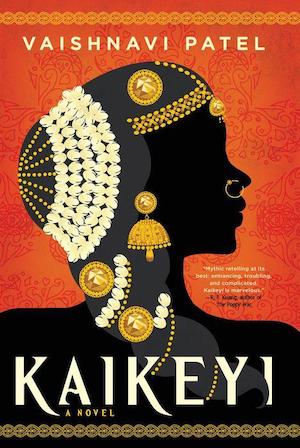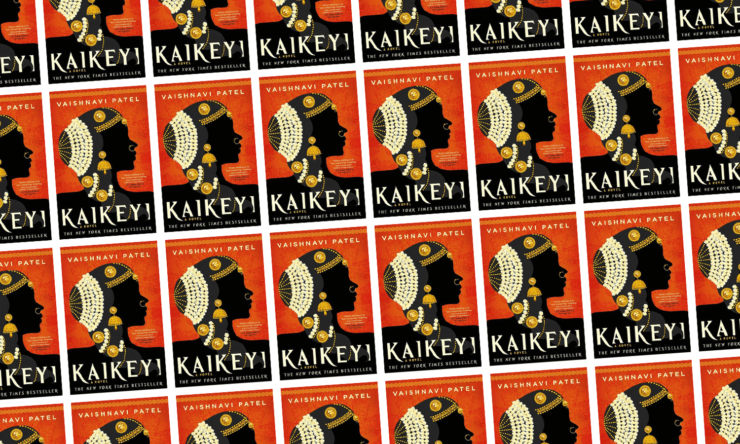The ancient Sanskrit epic the Ramayana is the story of Lord Rama’s quest to rescue his wife Sita from the evil clutches of the invincible demon king Ravana. Along with the Mahabharata, the Ramayana is a vital text in Hinduism, which means millions of people all over the world know it well, and would probably hold to high standard any story based on it.
Luckily for debut novelist, Vaishnavi Patel, many western readers would have absolutely no idea of the source material at all, and will probably enjoy what will be welcomed as a fresh new voice offering a diverse non euro-centric ‘fantasy’. Her new book Kaikeyi is touted as a feminist retelling of the story of a vilified queen from the Ramayana, the second wife of Dasharath of Ayodhya, a woman known for having forced Rama into exile for fourteen years, and so setting him on his personal hero’s journey. It’s been compared the Madeline Miller’s startling Circe, which is probably an unfair comparison, even for a novel less confused and untethered as Kaikeyi.
In the novel Patel explores the backstory of the titular character, starting with her birth as the only girl born to a father who does not bother much with her, and a mother who leaves suddenly one day. Her only maternal figure is Manthara, the nursemaid who accompanies Kaikeyi when she is married off to King Dasharath as his third wife (Why not second, as in the original source material? Who knows). While Kaikeyi is an independent, fierce girl trained as a warrior by her twin brother, and is clear that an arranged marriage is not for her, upon meeting Dasharath she immediately recognises that he is a kind man (how does she know so fast? Who knows), and agrees to marry him. She does however, make him promise before the court and the gods that any son she bears will be king, regardless of any other progeny Dasharath may have.
It’s clear from the onset that Kaikeyi can take care of herself, and will manage any power struggles well. Thanks to some magical scrolls she finds, she trains herself to enter the Binding Plane, a parallel metaphysical space in which she can literally see the ties that bind people to each other, and especially to her. She learns to manipulate and manage these bonds, and is able to strengthen some, using them to get what she wants. This starts of innocently enough: a little nudge to get her twin brother to train her, a little pull at her Manthara to get her to divulge some information; but it soon progresses to larger things, albeit mostly ones that can be seen as being part of a greater good. For Kaikeyi quickly develops from a sad, petulant teenager to a young woman with grand plans for the betterment of the kingdom, primarily for women. She soon develops strong bonds in her new home, with Dasharath’s first two wives, and with him, and is able to make major positive changes for many women, all the while establishing herself not just as favourite wife, but also as favourite advisor to the king.
Buy the Book


Kaikeyi
Meanwhile, after some divine intervention, Dasharath is able to father four sons from his three wives, all born so close that they are raised as a unit, equally loved by all the queens. It is soon clear, though, that Rama is different from his brothers, that there is something special about him, a divinity that no one else has. As a child, he appears conflicted, and Kaikeyi worries about the patriarchal influences of older sages on Rama, but she does her best to keep him at an even keel, especially after she accepts that he is the true heir to the throne, regardless of the promise she may have extracted from Dasharath for her own son Bharata to be king. But not everyone is willing to accept Dasharath reneging his promise, and so Kaikeyi must attempt to keep peace in the land by demanding that Bharata inherit the crown, and that Rama be exiled for ten years (why not fourteen as in the original epic? Who knows). This, it turns out, is a Very Bad Idea, because some things cannot be changed. Like history.
None of this is a spoiler. This is what the Ramayana is about. None of this is new. What’s new is the constant attempt to show Kaikeyi as selfless, as someone whose every action is motivated by a greater good.
In trying to absolve a character vilified in canon, Patel has given us a confused narrative, in which Kaikeyi the character remains destructive, but all her actions are constantly justified as having noble intent. She spends years pushing and prodding people magically into doing what she thinks best, but because it is for the betterment of women (in that she helps create a more progressive and less sexist society in Ayodhya), is she suddenly no longer a villain?
Not to suggest that Patel’s Kaikeyi does not appear destructive sometimes, but it’s not an aspect that is explored or even brought to the forefront. We are constantly reminded of how Kaikeyi is trying to do the right thing for the kingdom, the progressive thing, the feminist thing. We are reminded quite heavy handedly.
“You did the right thing,” Manthara told me.
“No matter what is said about you, Kaikeyi, remember that you did the right thing. You are not wicked.”
“Then why do I feel wicked?” I whispered.
“Because those who are good question themselves. Because those who are good always wonder if there was a better way, a way that could have helped more and hurt less. That feeling is why you are good.” She too pressed a kiss to my forehead.
“This will be terrible, but you are so strong. You can make it through.”
Even if this is ‘feminist’ narrative, why must Kaikeyi be cast as ‘good’? Why does she need to be redefined as fair, why must there always be noble justifications to her manipulations; why can’t she just have selfish demands and desires? There is very little nuance in this character, who is further flattened by some awkward, stilted dialogue. Giving a villain a backstory that makes them an empathetic and relatable character is always a hard task, but it does not require the character to be recreated as wholly good. It requires them to be human.
Kaikeyi is published by Redhook.
Mahvesh loves dystopian fiction and appropriately lives in Karachi, Pakistan. She writes about stories when not wasting much too much time on Twitter.










